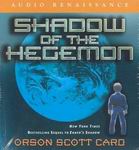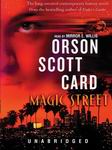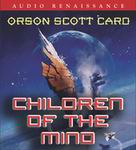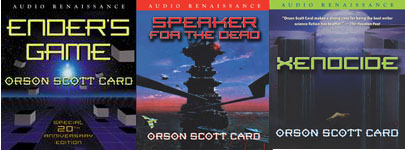
 Cheater
Cheater
By Orson Scott Card; Read by Orson Scott Card
1 MP3 File – 33 Minutes [UNABRIDGED]
Publisher: Orson Scott Card’s Intergalactic Medicine Show
Published: October 2006
ISBN: None
Han Tzu was the bright and shining hope of his family. He wore a monitor embedded in the back of his skull, near the top of his spine.
A brand new story from the Ender universe. This story is an audio bonus in the current issue of Orson Scott Card’s Intergalactic Medicine Show (issue #3). Han Tzu was a minor character in the SFFaudio Essential Ender’s Game, like previous audio entries in the Enderverse of late, this is a tale that ‘fills up the corners’ (as the Hobbits say) giving a backstory to the character nicknamed “Hot Soup.” Fans of the Enderverse will remember that Han Tzu was one of Ender’s toon leaders while he was in Dragon Army during the original novel Ender’s Game. Han Tzu later plays a more prominent role in the novels Shadow Puppets and Shadow Of The Giant. Here though, we meet him younger than anywhere prior in an interesting morality tale about Han Tzu and the circumstances of his admission to Battle School. His mother, who Han Tzu rarely gets to see, is a brilliant scientist. His father is one of the wealthiest men in China, a descendant of a famous Chinese family, and a businessman with long term plans for his son. Poor Han Tzu is never allowed to leave the confines of his father’s estate. Instead, the nation’s finest tutors are brought there to teach him, and even the few friends he gets to play with have been specially chosen, and likely been paid to be his friend. This has all been in an effort to mould him into a man capable of being the next Emperor of China. He might even get that chance, despite his father’s plans.
Though I can’t say I agree with his politics, I cannot dispute the power Orson Scott Card’s writing. This man knows how to tell a story and make you sympathize and love his wonderous worlds. Cheater is only tangentially related to Science Fiction; nothing SF happens in the story that hadn’t happend in Ender’s Game. That said, if you’ve read and liked other stories in the Enderverse you’ll want to hear this story. Like in Ender’s Shadow, spending more time with individuals of Ender’s jeesh (an inner circle or group of close friends) is a special treat. If Card wanted to record one of these tales for the next half-dozen issues of Orson Scott Card’s Intergalactic Medicine Show I’d listen, and be eager to hear them. Card recorded this story in a relatively good sounding environment, but there is a noticeable hiss of white noise that follows his reading from start to finish. As to his performance, like a surprisingly high number of author/narrators, Card reads his own work very well though I imagine Stefan Rudnicki’s performance would have been even better.
Posted by Jesse Willis






 We missed a great title in our recent New Releases post. Just in from Audio Renaissance is Orson Scott Card’s Children of the Mind, which completes the original 4-volume Ender series, all on unabridged audio! Preceding this book are Ender’s Game, Speaker for the Dead, and Xenocide. Audio Renaissance has page dedicated to the Enderverse on audio –
We missed a great title in our recent New Releases post. Just in from Audio Renaissance is Orson Scott Card’s Children of the Mind, which completes the original 4-volume Ender series, all on unabridged audio! Preceding this book are Ender’s Game, Speaker for the Dead, and Xenocide. Audio Renaissance has page dedicated to the Enderverse on audio – 